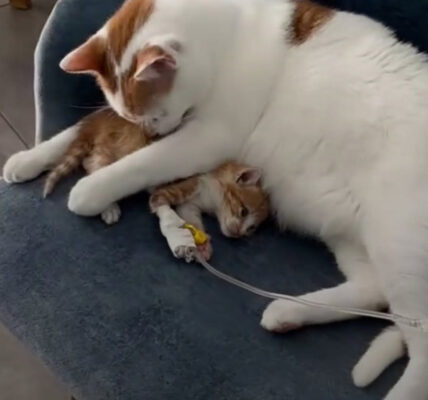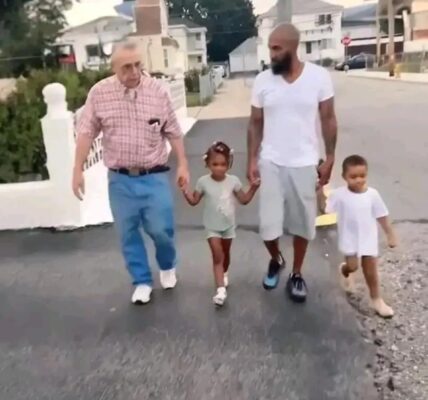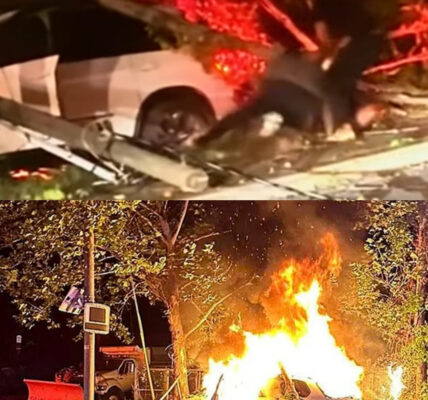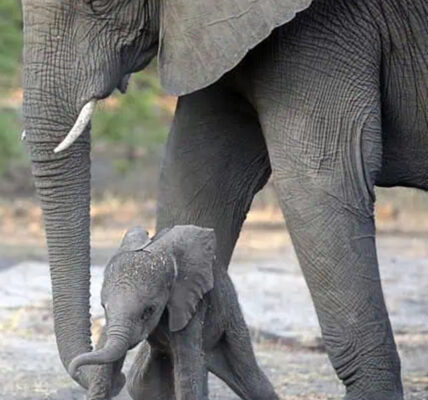When Andrew was six years old, his life split into “before” and “after.”

Before — he had parents, siblings, a home that felt familiar, even if it was broken.
After — a judge decided his parents could no longer care for him, and everything he knew was taken away in a single ruling he was too young to understand.
He was placed into foster care.
His brothers and sisters were adopted by another family.
But Andrew wasn’t.
There was no explanation a six-year-old could hold onto except the one that slowly carved itself into his chest:
They wanted them, but not me.
He carried that belief like an invisible bruise. Every birthday candle, every bedtime, every moment another family came to visit the foster home and looked at him — and then looked away — just made the bruise darker.
By the time he was ten, he had learned three things about the world:
Don’t trust anyone.
Don’t expect to stay anywhere.
Don’t let people close — because leaving hurts most when you love them.
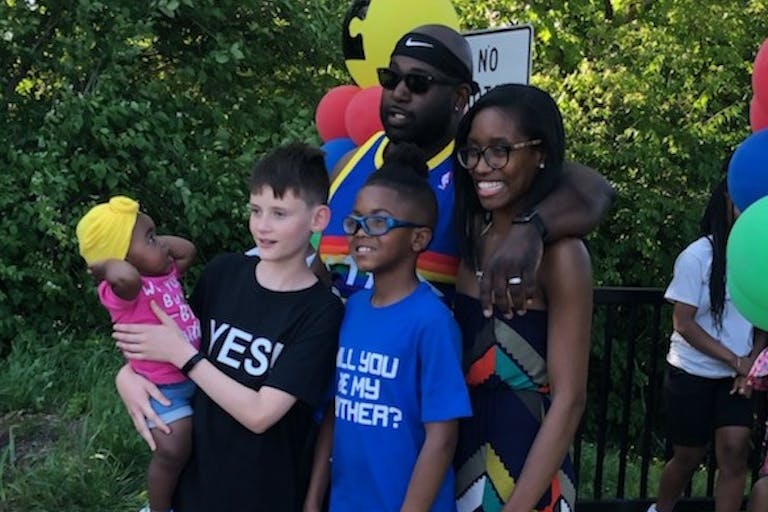
That was the boy who arrived at the home of Dominique and Kevin Gill in Nashville, Tennessee.
They were used to fostering children. Used to brokenness, anger, silence, fear. But something about Andrew was different. He didn’t yell or break things. He didn’t try to be liked. He didn’t even pretend to want to belong.
He did the one thing a hurting child believes will protect them:
He stayed silent.
Dominique remembers it clearly: “During his first week with us, he stayed in his room with the door closed, looking at old pictures. He didn’t want to talk. He barely ate. He just sat on the floor and stared at his past.”
Every night she would knock, gently — not to force him out, but just to say she was there. Most nights he didn’t respond.
But she never stopped knocking.
The Anger Behind the Silence
The first explosion didn’t come right away. It arrived weeks later, like a storm that had been building behind his quiet eyes.
He came home from school angry. He didn’t speak. He didn’t eat. And when Dominique tried to ask what was wrong, he finally shouted what his heart had been screaming for years:
“Just let me move out! I don’t want to be here! I’m not staying!”
It wasn’t just rage — it was panic.
It wasn’t that he didn’t want a family — it was that he didn’t believe he deserved one.
Dominique didn’t raise her voice. She didn’t threaten consequences. She didn’t say what so many adults say to broken children: “Be grateful, we’re helping you.”
Instead, she said softly, “We’re not sending you away. We’re going to help you get better.”
That sentence — we are not sending you away — was the first crack in his wall.
Because no one had ever said it to him before.
The Moment That Changed Everything
Andrew didn’t trust Dominique or Kevin yet. But someone else was waiting for him in the house — their eight-year-old son, Joc. A boy who didn’t care about the past, the file, the trauma, the labels.
Just another kid.
One afternoon, Joc knocked on Andrew’s bedroom door and simply asked:
“Do you want to play video games?”
No pity.
No pressure.
Just an invitation.
Andrew stared at him for a long moment — waiting for the kind of disappointment he was used to.
But Joc didn’t go away.
Andrew nodded.
They played in silence at first. No deep conversations. No forced bonding. Just two kids in front of a screen, sharing something fun in a world that finally didn’t demand anything of him.
That was the day the house changed.
Soon they were laughing.
Then talking.
Then racing each other down the stairs for breakfast.
Then arguing like brothers — the good kind of arguing.
One night, Dominique heard them whispering under blankets after bedtime. She stood outside the door and listened.
Joc said quietly, “I’m glad you’re here.”
Andrew didn’t speak for a moment.
Then he whispered back, “Me too.”
That was the first time he said it — Me too — as if admitting that maybe, just maybe, he wanted to stay.
The Question That Changed His Life
Weeks turned into months. Walls turned into windows. Andrew began joining family dinners instead of eating alone. He started going outside. He started smiling without waiting for something bad to follow.
One evening, Dominique and Kevin sat the boys at the table.
Kevin looked at Andrew and said, “We need to ask you something.”
Andrew’s body tensed. He thought he was leaving. Every foster child knows the signs — the quiet talks, the serious tone, the long sigh before the words.
But instead of separation… they offered something he had stopped believing was possible.
“Would you like to be our son?”
Not just stay here.
Not just be part of the house.
But be our son.
Andrew didn’t speak.
His mouth trembled. His hands shook. For a moment, he tried to hold his face still — like a boy fighting tears he wasn’t allowed to show.
Then the tears came anyway.
He sobbed — not from sadness, but from finally being seen.
“Yes,” he said through the tears. “Thank you for accepting me. Thank you for not giving up on me.”
Dominique reached for him, and for the first time in his life, Andrew didn’t pull away from love.
He leaned into it.
What Love Does to a Wounded Child
After the adoption was finalized, Andrew said something no one expected.
“I used to go to bed thinking nobody wanted me. Now I go to bed knowing somebody does.”
His school counselor noticed the change. His grades rose. His laughter got louder. He walked into rooms instead of shrinking inside them.
He still had scars — emotional ones don’t disappear overnight — but now he had a place to put them.
A home.
A mother who knocked on the door even when he didn’t answer.
A father who never once threatened to “send him back.”
A brother who didn’t choose him out of pity — but out of friendship.
And a truth he would spend years learning to believe:
He wasn’t left behind because he was unlovable.
He was left behind because the right people hadn’t found him yet.
The Heart of the Story
There are thousands of children like Andrew — children who whisper “Don’t get attached” because life taught them attachment equals pain.
Some become quiet.
Some become angry.
Some pretend they don’t care.
But every single one of them is waiting for the same thing:
Not perfect parents.
Just people who refuse to leave.
Love doesn’t fix trauma overnight.
But love makes healing possible.
And sometimes — all it takes is one family saying the words the world never gave them:
“You belong here.”
“We want you.”
“You are enough.”
Every child deserves to hear that.
Every child deserves a place where the door doesn’t close behind them — it opens.

